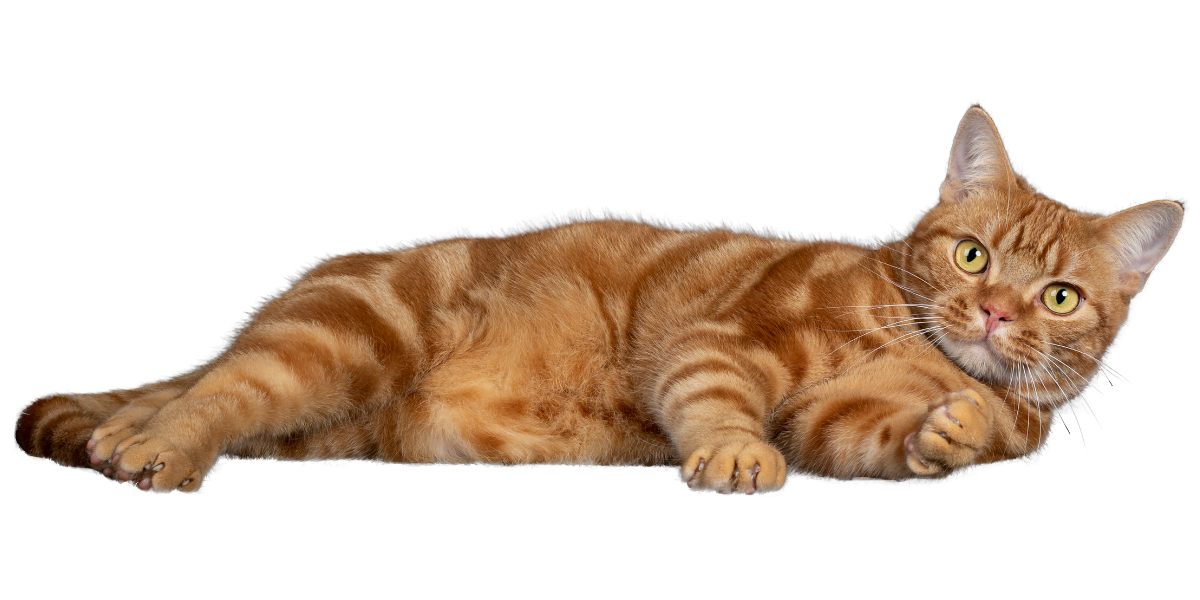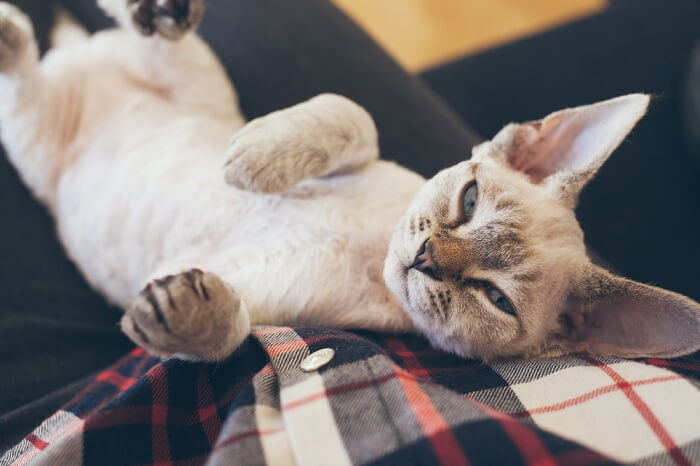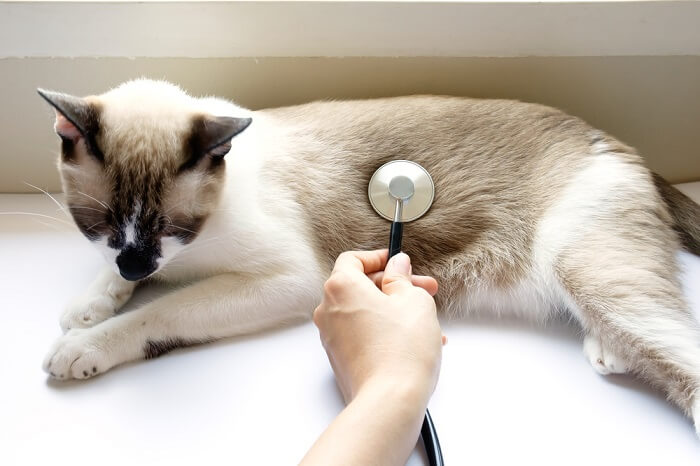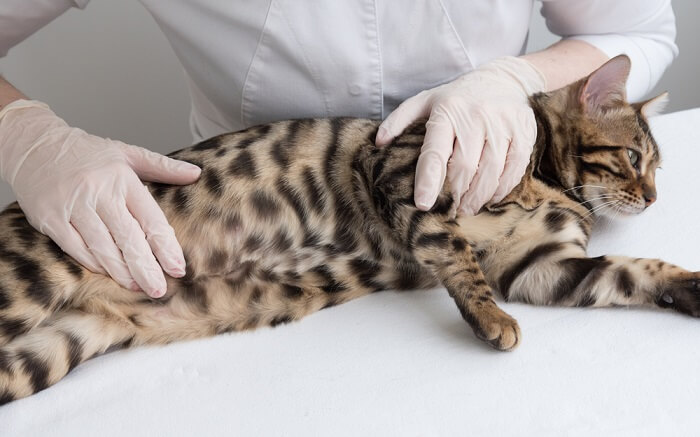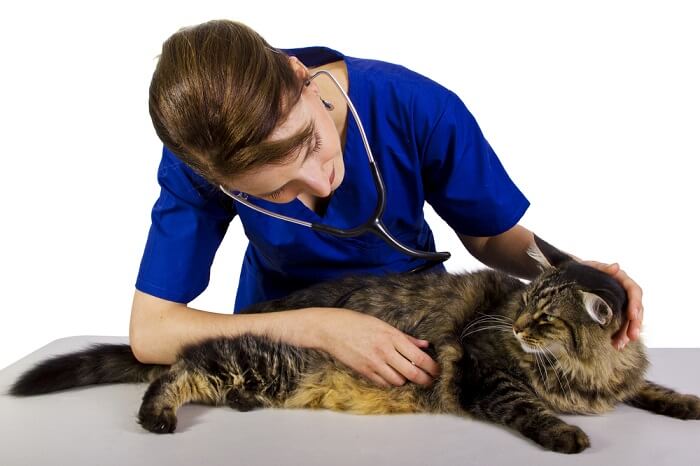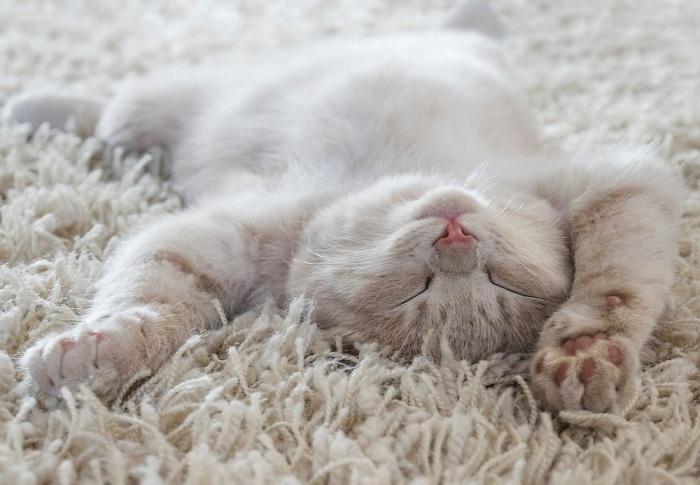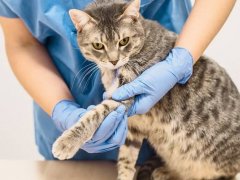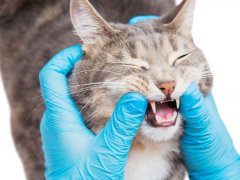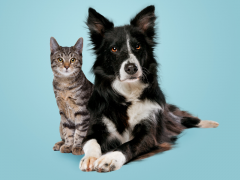Most cats will have an upset stomach at some point in their lives. This might involve vomiting, diarrhea, or a bit of both. It can make our feline friends feel under the weather and not their usual happy, energetic selves.
Mild upset tummies will resolve in a day or two, but other cases might need some treatment at home or from a veterinarian. We’ll discuss everything that you need to know about upset stomachs and what you can give your cat for them at home.
Symptoms Of An Upset Stomach In Your Cat
Cats try not to let on that they are feeling unwell but you can look for some telltale signs.
Cats are very brave pets and often hide signs of illness. This is because, in the wild, illness is a sign of weakness and makes them vulnerable to attack by other cats and animals. Pet cats still have this instinct to hide illness, which can make it difficult to know if they are unwell.
However, in cases of an upset stomach, the symptoms should be easy to spot. You might notice vomit around the house or lawn and diarrhea in the litter box. If your cat toilets outside, this can be more difficult to spot and you need to pay close attention to where they relieve themselves and other symptoms that they might be displaying.
Cats that are vomiting and/or having diarrhea may have other symptoms of stomach upset too. If your cat is feeling sick, it’s likely that their appetite will be reduced. You might also see signs of nausea, which include lip-licking, drooling, flinching at the food bowl (because the smell makes them feel sick), or eating grass (although this is more common with dogs).
Other symptoms include:
- Lethargy
- Sore/tender stomach
- Gurgling sounds from the stomach
- Decreased or increased drinking
The above are common symptoms of a traditional upset stomach. However, if your cat is very lethargic, has a very sore abdomen, or has stopped passing poop, then you should see your veterinarian right away. The same advice applies if you notice blood in their vomit or diarrhea. These could be signs of a more serious issue (e.g., a bowel obstruction) and aren’t simple upset stomachs.
Also Read: Gastroenteritis In Cats: Causes, Symptoms, & Treatment
What Causes Upset Stomachs In Cats?
If your cat is vomiting or having diarrhea and seems to be feeling very unwell, visit your veterinarian sooner rather than later.
Now that we know what symptoms to look out for, our next question is what causes upset stomachs in cats? Some include gastrointestinal causes (e.g., inflammatory bowel disease) or causes outside of the gastrointestinal system (e.g., chronic kidney disease).
Common causes of upset stomachs in cats include:
- Dietary indiscretion (eating something that they shouldn’t)
- Dietary changes
- Toxins (e.g., ingesting toxic plants, like lilies)
- Stress
- Viral infections
- Bacterial infections
- Parasites
- Hairballs
- Food allergies/sensitivities
- Inflammatory bowel disease
- Foreign bodies/obstruction (e.g., eating a piece of plastic)
- Cancer
- Pancreatitis
- Kidney disease
- Liver disease
- Diabetes mellitus
- Hyperthyroidism
This isn’t an exhaustive list but it includes the most common causes. From this list, the most common culprit behind a mild upset stomach would be due to diet. Sometimes a recent change to a new cat food, eating new treats, or even swiping some human food off the counter can cause stomach upset. Cats’ tummies are sensitive to diet changes and this can be enough to cause some mild vomiting and diarrhea.
Another common cause from the list is stress. Cats that have been introduced to a new family or a new home are likely to have some mild diarrhea initially due to stress but it should resolve quickly.
Young kittens are particularly prone to heavy intestinal parasite burdens and this can cause upset tummies so it’s important to think of this cause if you have a kitten.
Older cats will be particularly prone to developing chronic kidney disease, hyperthyroidism, liver disease, and diabetes mellitus. If you have an older cat with an upset stomach and other symptoms such as increased drinking and urination, you should visit your vet.
Also Read: 10 Subtle Signs Your Cat May Be Sick
What Can You Give A Cat For An Upset Stomach?
Mild stomach upset might resolve on its own in about 24 hours, or improve with a few days of a bland diet.
Mild cases of upset stomachs can be treated at home initially if your cat seems well otherwise. This means that they should be relatively alert and bright, still interested in eating some food, still drinking, and passing regular feces.
Very mild cases will often resolve themselves within 24 hours. Your cat might only have one to two bouts of vomiting and/or diarrhea and that might be it. These cases don’t need any treatment but you should monitor your cat for a few days for any reoccurrence.
Cases that aren’t resolving or that are more severe will require some treatment. You can feed your cat a bland diet, such as boiled chicken and white rice, or buy a therapeutic diet from the pet-supply store or your veterinarian. These diets will often be labeled as “gastrointestinal” or “sensitive” foods. Avoid feeding any other human foods or treats.
Probiotics can be useful in cases of an upset stomach as they put good bacteria back into your cat’s gut. They don’t have any known side effects and are safe to use. You can buy these from your veterinary clinic or over the counter in some pet stores.
For cats that are feeling stressed, you can plug in a synthetic pheromone diffuser (Feliway) and provide plenty of resources to increase their comfort. Resources include food bowls, water bowls, beds, litter boxes, scratching posts, and hiding areas.
Ensure that your cat is up to date with their worming treatment. This is particularly important if your cat goes outside and hunts as they’re more susceptible to worms. Kittens are quite vulnerable to heavy worm burdens and this can cause upset stomachs so keep this in mind if you have a kitten.
Older cats are prone to underlying conditions so if they have an upset tummy that isn’t resolving or is very severe, it’s worth keeping in mind that they could have an underlying condition and need to see their vet.
If the above home remedies aren’t resolving the upset stomach, then you will need to take your cat in for veterinary treatment.
Also Read: The 6 Best Cat Food For Sensitive Stomach
When To Seek Treatment From A Vet
See your vet right away if your cat has diarrhea and/or vomiting and is also displaying other symptoms of illness.
Most mild cases of an upset stomach will resolve by themselves within 24 hours or with a bland diet and probiotics. If the upset stomach isn’t resolving you should seek advice from your veterinarian. Likewise, if the upset stomach is very severe or if your cat is displaying other symptoms they should have a vet visit. Other symptoms to monitor for include but aren’t limited to:
- Increased drinking
- Increased urination
- Reduced or lack of appetite
- Weight loss
- Severe lethargy
- Vomiting water
- A bad smell from their breath
- Yellow tinge to their gums (jaundice)
- Very painful abdomen
These symptoms might indicate that there’s an underlying cause for the upset stomach. Be sure to tell your vet about any symptoms that you can think of. They’ll examine your cat and might run some tests if they’re worried about underlying conditions. This can include a stool sample, urine testing, blood testing, x-rays (radiographs), and ultrasound.
Some more serious causes of vomiting and diarrhea might need surgery for instance, in the case of a bowel obstruction. Other causes, such as inflammatory bowel disease, might need steroids, antibiotics, and a special diet. If your cat has food allergies your vet will likely suggest doing a food trial with a hypoallergenic diet or a novel protein diet for at least six weeks.
The bottom line is to visit your veterinarian if you’re concerned about your cat or if you think their upset stomach isn’t resolving quickly.
Also Read: Best Cat Food For IBD
Stomach Upset: Final Thoughts
Stomach upset can have many different causes, so enlist the help of your vet if it doesn’t clear up in 24 hours or so.
Upset stomachs are a common occurrence in our feline friends. They can occur from eating something different (e.g., a new diet or some human food from the counter), parasites, stress, food allergies, or an underlying condition. Bland diets and probiotics can be useful in treating mild upset stomachs. Always ensure that your cat is up to date with their worming treatment and veterinary care. Visit your vet if the upset stomach isn’t resolving or if your cat has other symptoms that you’re worried about.
Also Read: Stomach Cancer In Cats: Causes, Symptoms & Treatment
Frequently Asked Questions
What do vets give cats for upset stomach?
Vets can give cats anti-nausea medication, probiotics, steroids, and antibiotics depending on the cause. They might also recommend worming treatment and a therapeutic diet.
How long does upset stomach last in cats?
Mild upset stomachs usually last less than 24 hours and the symptoms shouldn’t be severe. If it’s lasting longer than this you should contact your local veterinarian.
Can I give my cat milk for an upset stomach?
No, it isn’t recommended to give your cat milk. Cats are lactose intolerant, so the milk could actually make the upset stomach worse. Continue to encourage water.
How do I know if my cat has an upset stomach?
Symptoms of an upset stomach include vomiting, diarrhea, nausea (lip licking, drooling), gurgling from their tummy, and lethargy. Their appetite can also be reduced.
